Abstract
OBJECTIVE: This study was performed to examine the relation between phenotypic expression in patients with familial adenomatous polyposis (FAP) and the site of mutations in the APC (adenomatous polyposis coli) gene. The ability of APC mutations to predict surgical outcome was also investigated. SUMMARY BACKGROUND DATA: Germline mutations in the APC gene cause FAP and can now be identified by direct mutational analysis. Such an analysis can identify affected persons for close surveillance and spare unaffected persons. Phenotypic expression varies within and among FAP kindreds, but certain mutations have been associated with severe disease. Patients with severe polyposis are frequently offered total proctocolectomy rather than colectomy and ileorectal anastomosis out of concern for increased rectal cancer risk. Mutation analysis may offer a more rational basis for these decisions. METHODS: The postsurgical courses of 58 patients from 19 FAP kindreds with identified APC gene mutations were reviewed. APC gene mutations were identified by analysis of leukocyte DNA using single-strand conformational analysis and DNA sequencing. FAP severity was defined according to the number of polyps in the colon at the time of resection (< 1000, mild; > 1000, severe). Operations included subtotal colectomy with ileorectal anastomosis (IRA), total proctocolectomy with ileal pouch/anal anastomosis, total proctocolectomy with end ileostomy, and partial colectomy (PC). RESULTS: Eight different APC mutations were identified. Mutations at codons 1309 and 1328 in exon 15G were associated with a uniformly severe polyposis phenotype. For other mutations, the phenotype was more variable. Patients with APC mutations at codons 1309 and 1328 more commonly underwent proctectomy. Among the 43 patients who initially underwent either IRA or PC, the rectum was later removed in 8. Seven of these patients had a mutation at codon 1309 or 1328. With one exception, all patients with mutations outside the 1309 or 1328 site who initially had IRA have retained their rectum. CONCLUSIONS: Our data support an association between severe polyposis phenotype and mutations at APC gene codons 1309 and 1328. For patients with these mutations, the prognosis for retaining the rectum is poor.
Full text
PDF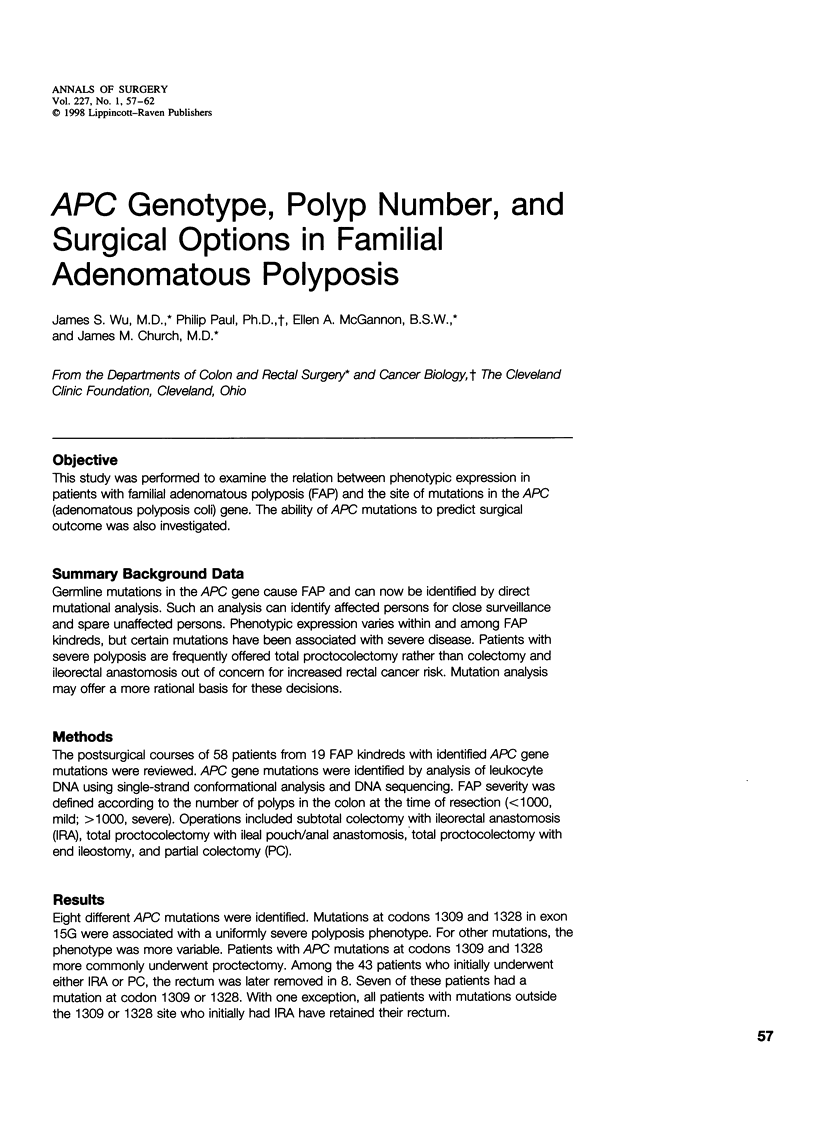
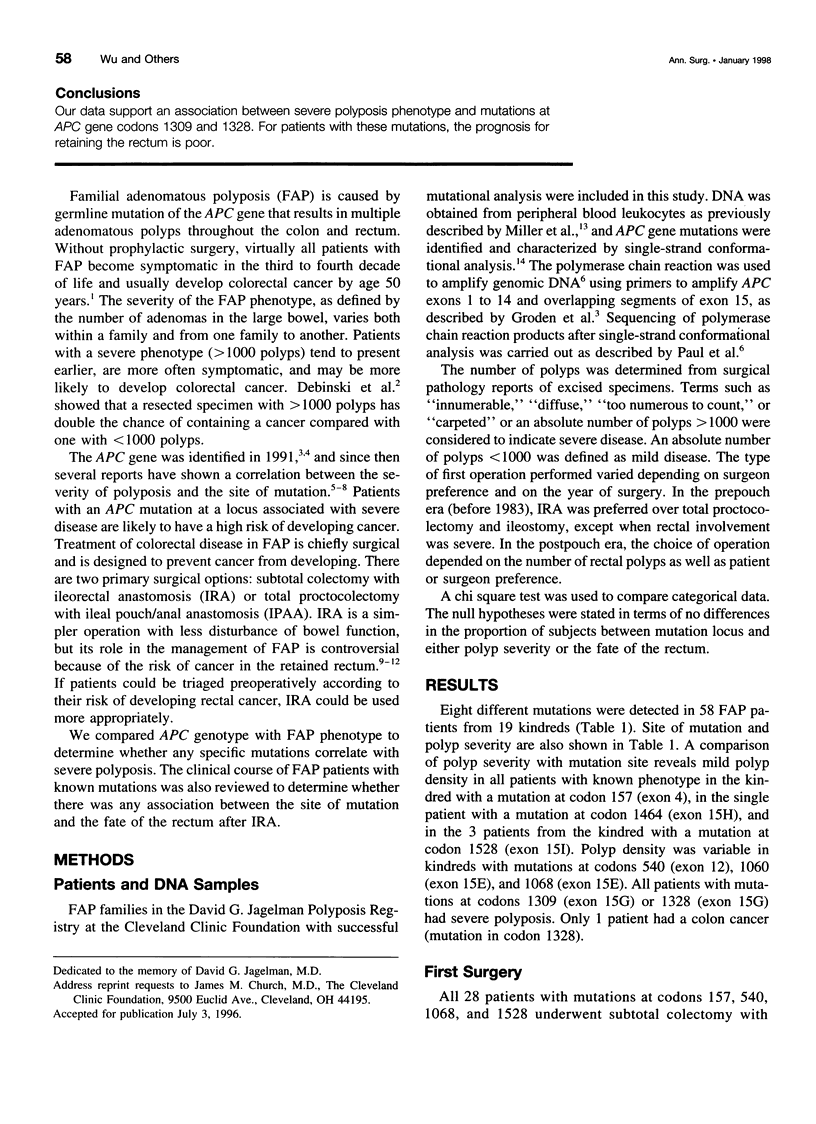
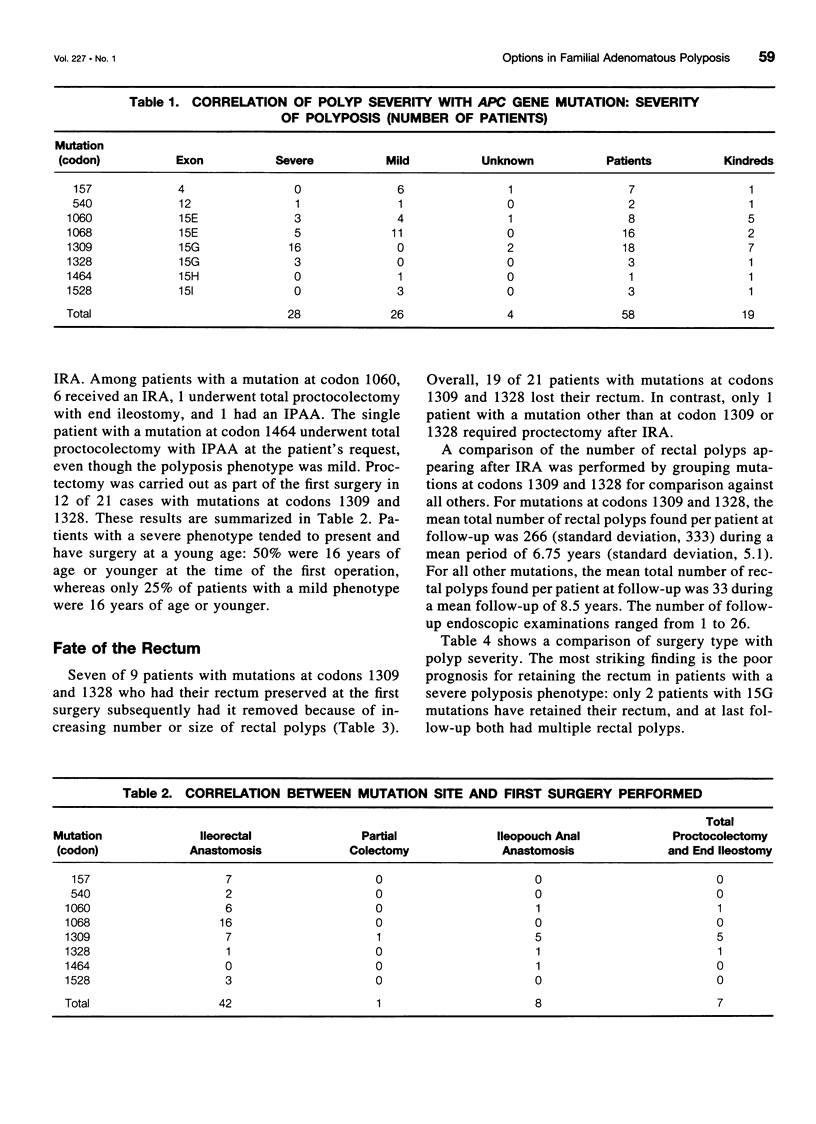
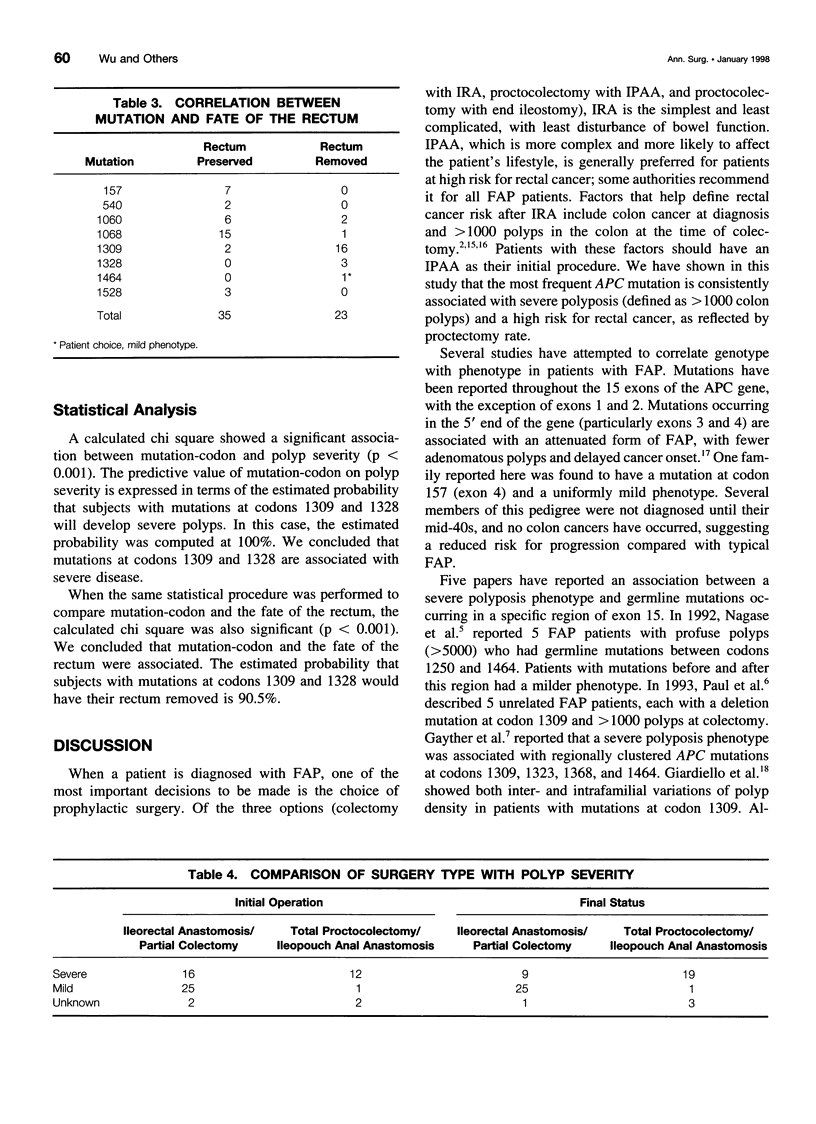
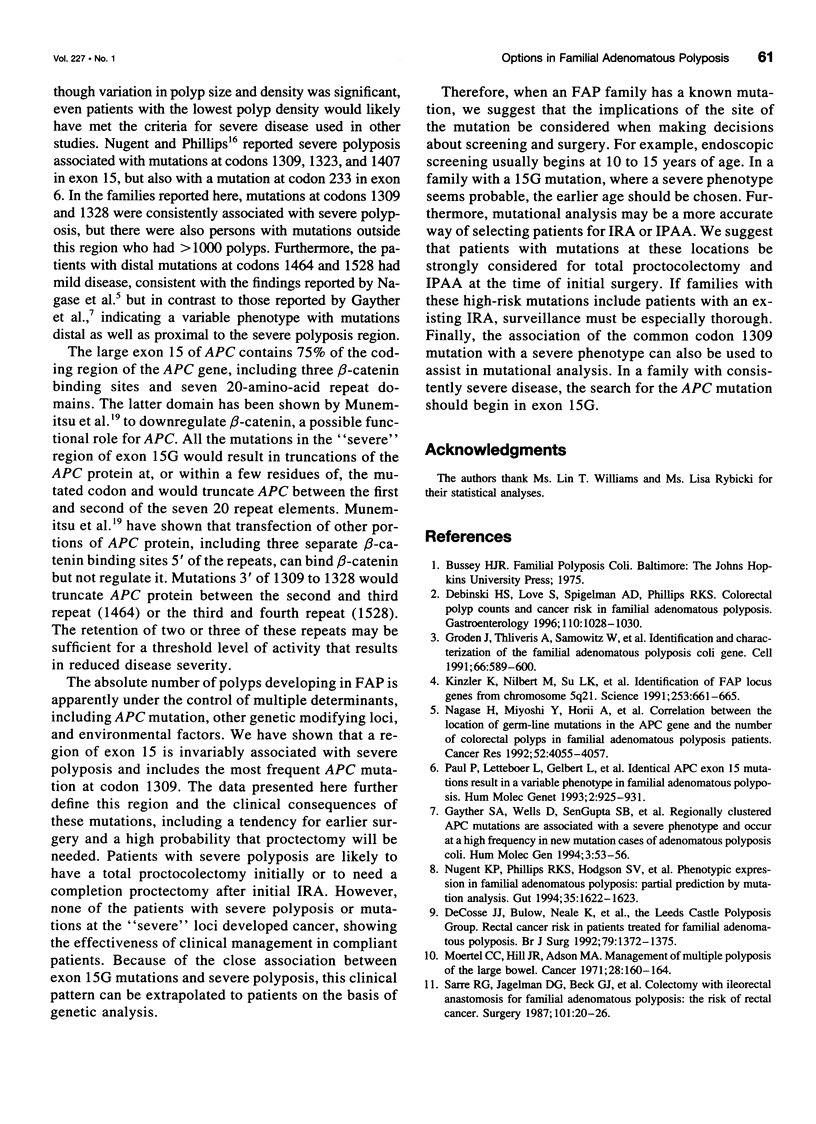

Selected References
These references are in PubMed. This may not be the complete list of references from this article.
- De Cosse J. J., Bülow S., Neale K., Järvinen H., Alm T., Hultcrantz R., Moesgaard F., Costello C. Rectal cancer risk in patients treated for familial adenomatous polyposis. The Leeds Castle Polyposis Group. Br J Surg. 1992 Dec;79(12):1372–1375. doi: 10.1002/bjs.1800791245. [DOI] [PubMed] [Google Scholar]
- Debinski H. S., Love S., Spigelman A. D., Phillips R. K. Colorectal polyp counts and cancer risk in familial adenomatous polyposis. Gastroenterology. 1996 Apr;110(4):1028–1030. doi: 10.1053/gast.1996.v110.pm8612989. [DOI] [PubMed] [Google Scholar]
- Gayther S. A., Wells D., SenGupta S. B., Chapman P., Neale K., Tsioupra K., Delhanty J. D. Regionally clustered APC mutations are associated with a severe phenotype and occur at a high frequency in new mutation cases of adenomatous polyposis coli. Hum Mol Genet. 1994 Jan;3(1):53–56. doi: 10.1093/hmg/3.1.53. [DOI] [PubMed] [Google Scholar]
- Giardiello F. M., Krush A. J., Petersen G. M., Booker S. V., Kerr M., Tong L. L., Hamilton S. R. Phenotypic variability of familial adenomatous polyposis in 11 unrelated families with identical APC gene mutation. Gastroenterology. 1994 Jun;106(6):1542–1547. doi: 10.1016/0016-5085(94)90408-1. [DOI] [PubMed] [Google Scholar]
- Groden J., Thliveris A., Samowitz W., Carlson M., Gelbert L., Albertsen H., Joslyn G., Stevens J., Spirio L., Robertson M. Identification and characterization of the familial adenomatous polyposis coli gene. Cell. 1991 Aug 9;66(3):589–600. doi: 10.1016/0092-8674(81)90021-0. [DOI] [PubMed] [Google Scholar]
- Iwama T., Mishima Y. Factors affecting the risk of rectal cancer following rectum-preserving surgery in patients with familial adenomatous polyposis. Dis Colon Rectum. 1994 Oct;37(10):1024–1026. doi: 10.1007/BF02049317. [DOI] [PubMed] [Google Scholar]
- Kinzler K. W., Nilbert M. C., Su L. K., Vogelstein B., Bryan T. M., Levy D. B., Smith K. J., Preisinger A. C., Hedge P., McKechnie D. Identification of FAP locus genes from chromosome 5q21. Science. 1991 Aug 9;253(5020):661–665. doi: 10.1126/science.1651562. [DOI] [PubMed] [Google Scholar]
- McLaughlin C. W., Jr, Coe J. D. Reliability of conventional indications for common bile duct exploration. Arch Surg. 1970 Apr;100(4):421–423. doi: 10.1001/archsurg.1970.01340220097017. [DOI] [PubMed] [Google Scholar]
- Miller S. A., Dykes D. D., Polesky H. F. A simple salting out procedure for extracting DNA from human nucleated cells. Nucleic Acids Res. 1988 Feb 11;16(3):1215–1215. doi: 10.1093/nar/16.3.1215. [DOI] [PMC free article] [PubMed] [Google Scholar]
- Moertel C. G., Hill J. R., Adson M. A. Management of multiple polyposis of the large bowel. Cancer. 1971 Jul;28(1):160–164. doi: 10.1002/1097-0142(197107)28:1<160::aid-cncr2820280132>3.0.co;2-q. [DOI] [PubMed] [Google Scholar]
- Munemitsu S., Albert I., Souza B., Rubinfeld B., Polakis P. Regulation of intracellular beta-catenin levels by the adenomatous polyposis coli (APC) tumor-suppressor protein. Proc Natl Acad Sci U S A. 1995 Mar 28;92(7):3046–3050. doi: 10.1073/pnas.92.7.3046. [DOI] [PMC free article] [PubMed] [Google Scholar]
- Nagase H., Miyoshi Y., Horii A., Aoki T., Ogawa M., Utsunomiya J., Baba S., Sasazuki T., Nakamura Y. Correlation between the location of germ-line mutations in the APC gene and the number of colorectal polyps in familial adenomatous polyposis patients. Cancer Res. 1992 Jul 15;52(14):4055–4057. [PubMed] [Google Scholar]
- Nugent K. P., Phillips R. K., Hodgson S. V., Cottrell S., Smith-Ravin J., Pack K., Bodmer W. F. Phenotypic expression in familial adenomatous polyposis: partial prediction by mutation analysis. Gut. 1994 Nov;35(11):1622–1623. doi: 10.1136/gut.35.11.1622. [DOI] [PMC free article] [PubMed] [Google Scholar]
- Nugent K. P., Phillips R. K. Rectal cancer risk in older patients with familial adenomatous polyposis and an ileorectal anastomosis: a cause for concern. Br J Surg. 1992 Nov;79(11):1204–1206. doi: 10.1002/bjs.1800791136. [DOI] [PubMed] [Google Scholar]
- Orita M., Iwahana H., Kanazawa H., Hayashi K., Sekiya T. Detection of polymorphisms of human DNA by gel electrophoresis as single-strand conformation polymorphisms. Proc Natl Acad Sci U S A. 1989 Apr;86(8):2766–2770. doi: 10.1073/pnas.86.8.2766. [DOI] [PMC free article] [PubMed] [Google Scholar]
- Paul P., Letteboer T., Gelbert L., Groden J., White R., Coppes M. J. Identical APC exon 15 mutations result in a variable phenotype in familial adenomatous polyposis. Hum Mol Genet. 1993 Jul;2(7):925–931. doi: 10.1093/hmg/2.7.925. [DOI] [PubMed] [Google Scholar]
- Sarre R. G., Jagelman D. G., Beck G. J., McGannon E., Fazio V. W., Weakley F. L., Lavery I. C. Colectomy with ileorectal anastomosis for familial adenomatous polyposis: the risk of rectal cancer. Surgery. 1987 Jan;101(1):20–26. [PubMed] [Google Scholar]
- Spirio L., Olschwang S., Groden J., Robertson M., Samowitz W., Joslyn G., Gelbert L., Thliveris A., Carlson M., Otterud B. Alleles of the APC gene: an attenuated form of familial polyposis. Cell. 1993 Dec 3;75(5):951–957. doi: 10.1016/0092-8674(93)90538-2. [DOI] [PubMed] [Google Scholar]


